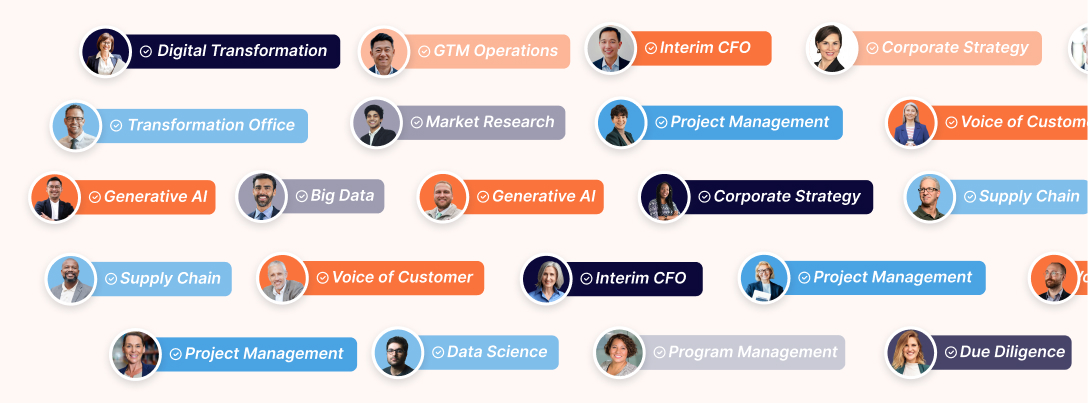Why Every Consulting Firm Needs a Virtual Talent Bench

Largely as a result of the global pandemic, the business world has increasingly moved toward a project-based work environment. Even before the pandemic, firms were competing with each other to hire the best talent, and with top-tier talent that was choosing to leave high-end firms to work independently.
Alongside these developments, there has been a clear shift toward an agile approach to getting work done and staffing. Agility is a requirement for firms that want to use ongoing change as an opportunity to meet client needs, gain a competitive edge, and grow. For consulting firms, this means infusing agility into traditional benches to establish virtual talent benches.
What is a virtual bench?
A virtual talent bench is an on-demand and flexible way to access subject matter experts who can be dropped into projects within their practice areas to drive value while keeping your firm agile and lean.
Benefits of a Virtual Talent Bench
- Meet customer needs quickly: Pre-vet the consultants who sit on your virtual talent bench so you can engage them immediately, drop them into projects that need their practice area expertise, and avoid lengthy times to source, onboard, or ramp talent.
- Optimize resources: Minimize additions to operating expenses and keep your firm lean by paying consultants on your virtual talent bench only when they’re engaged in a project.
- Bypass talent pinch points: Maintain a source of external, qualified consulting talent on your virtual bench to help you anticipate upcoming and recurring resourcing needs, and respond quickly to hard-to-staff engagements. Stack talent resources in high-demand areas to keep new projects from stalling.
Thinking about augmenting your team or expanding capacity? Here are five ways to use a virtual talent bench.
5 Ways to Use a Virtual Talent Bench
1. Staff your bench with the right talent.
A virtual talent bench optimizes for both quantity and quality, ensuring you have the right people (and enough of them) on call who can quickly be dropped into projects that relate to their practice areas and require industry knowledge. Your virtual talent bench serves as a single source of truth when it comes to extra capacity across each of your practice areas, enabling leaders to easily access consultants based on project and subject matter needs.
If you’re short-staffed, a virtual talent bench also gives you access to the added capacity your firm needs. For example, avoid placing your full-time consultants on too many projects at once as a response to high demand. Instead, keep full-time capacity where it is while taking on more work and delivering quality outcomes by leaning on the extra capacity offered by your virtual talent bench.
2. Keep a lean internal team.
Considering the macroenvironment and widespread hiring freezes, your firm may be prioritizing a lean, agile, and operationally-efficient approach to talent. A virtual talent bench accomplishes this for you because it’s the middle ground between full-time employees and a traditional talent bench. Staff your talent bench with several independent consultants that you hand-pick and pre-vet across the practice areas you are likely to need support.
For example, if you often need external support on diligence projects, identify and place three skilled and experienced independent consultants on your virtual talent bench who are fluent in that field of work. Since you won’t be paying for them to sit on your bench, this will keep your team lean while also ensuring a consultant will be available to support your project needs.
3. Expand your network of consultants who are suited for your talent bench.
When you go external to staff your talent bench, your network may not be as expansive as you need it to be. A virtual talent bench greatly expands your network while also making it easy to fill skill and knowledge gaps.
With a platform like Catalant, for example, you gain immediate access to 80,000 highly-skilled independent consultants who can sit on your talent bench and close gaps in subject matter expertise across it. If your firm values alumni experience, you can easily expand your network by adding independent consultants to your virtual talent bench who have worked at your firm, or other top-tier firms, in the past.
4. Inject flexibility into your practice.
Today, consulting firms need to flexibly tailor solutions to their client needs — for example, remain innovative when it comes to the types of clients they serve or explore different types of arrangements. A virtual talent bench can fill outer-zone and whitespace coverage that may not exist in current full-time coverage.
Being flexible also results in professional development opportunities for firms/full-time staffers. Instead of being forced to staff consultants in practice areas that they are unfamiliar with during periods of resource constraint, allow consultants who want to explore other practice areas to do so. Meanwhile, those who prefer continuing to develop in their current practice area can do so and new projects can be supported by subject matter experts on your virtual bench. By enabling your full-time consultants to optimize for efficiency and satisfaction, you’ll drive greater value for your clients and firm.
5. Let a platform manage the administrative aspects of your talent bench.
You may be wondering how to manage the often burdensome administrative processes associated with staffing your talent bench with external talent and/or independent consultants. If you choose to staff your virtual talent bench through a platform like Catalant, you gain immediate access to thousands of highly-skilled independent consultants — many of whom have experience at Fortune 500s and leading private equity firms — who you can interview and place on your virtual talent bench. If you prefer getting support from Catalant to build out your ideal virtual talent bench, the team is here to support you.
Catalant offers compliance services so engagements with the independent consultants on your talent bench are in accordance with your firm’s policies. The platform also correctly classifies consultants for tax and employment records and facilitates payment.
Want to learn how Catalant can help your firm create a virtual talent bench?
Let’s Talk











